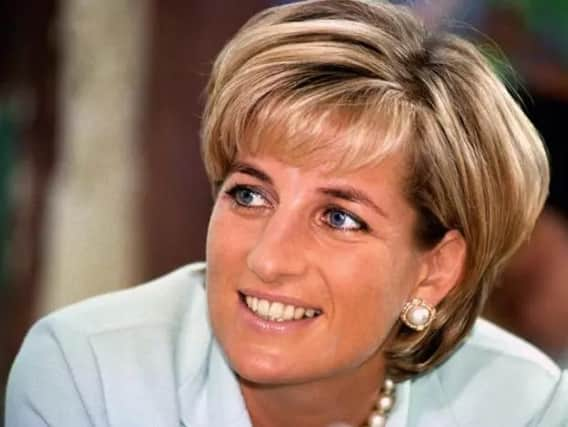Jayne Dowle: We have all been influenced by the death of Diana


For the record, 20 years ago today – the anniversary of her death – I was living in London, about to launch my first magazine as editor. My gut reaction was relief. The first edition had to be stalled for a fortnight because the presses were running at full pelt to produce extra newspapers and souvenir supplements.
This unexpected event in an underpass in Paris brought me much-appreciated extra time. I was so busy, Diana’s death didn’t actually register for about a day. And then it did. With such force it knocked me sideways.
Advertisement
Hide AdAdvertisement
Hide AdI suspect many people felt the same. I would suggest that even the Queen, sequestrated in Balmoral for the summer, couldn’t quite comprehend the enormity either. In those days it was rare to attribute feelings to the stolid monarch, but her first instinct was to keep Diana’s sons, William and Harry, then aged 15 and 12, safe and protected.
The Royals were much-criticised for staying away from London in the immediate aftermath. Members of the public complained to TV reporters that they didn’t “understand how we feel”. Yet, they couldn’t be expected to.
We may commemorate the death of the Princess of Wales as we wish, but we should recognise this moment as the beginning of the public deconstruction of the Royal Family. Diana’s death brought everything out to be pulled apart, analysed and put back together again.
I’ll give you an example. Without it, do you think that the 91-year-old Queen would have made an unscheduled trip to Manchester to visit the teenagers injured in the terrorist attack this May? It was the action of a mother, grandmother and great grandmother who had been forced to stare an ultimate family tragedy in the face herself; losing a daughter (in-law).
Advertisement
Hide AdAdvertisement
Hide AdI won’t go as far as to say that Diana’s death saved the monarchy and quelled all republican unrest. It did however provide the catalyst for much-needed reinvention. The Queen, and just as importantly, crucial family members and senior courtiers, only had to look out of the window to witness the hushed revolution taking place below.
In the days before widespread internet and smartphones, millions of people – and I don’t think I’m exaggerating – took the individual yet collective decision to descend on central London and lay flowers, write poems, light candles and search inside themselves for a way to express, what? Grief? Shock? Regret?
I had to go myself, to bear witness. And I will never forget the smell and the sound of the Mall leading to Buckingham Palace. One huge carpet of flowers and scented candles, accompanied by Faure’s Requiem Mass playing softly on loudspeakers. I will also never forget how people simply knew what to do.
Although Tony Blair, only three months into his tenure, took a compassionate and intuitive stance as Prime Minister, no political leader or official laid down rules or guidelines for public mourning. No one ordered single roses to be thrown along the route of her funeral cortege, nor said that children should take stuffed animals to her shrine. People just did.
Advertisement
Hide AdAdvertisement
Hide AdWith the distance afforded by hindsight, I’d argue that this was the dawning of a new kind of collective British consciousness. It certainly wasn’t the “keep calm and carry on” imposed solidarity of the Second World War. Each bloom, candle, teddy bear and card was chosen by an individual, of every creed and colour and sexuality. Yet all of it came together as one.
Interviewed for the excellent BBC documentary, Diana, 7 Days, Blair argues that her death had such an impact because the Princess of Wales was the first member of the Royal Family “to behave like a normal human being”. Given the failings of certain Royals hitherto, there are flaws to this argument, but his point is helpful in the wider analysis.
Diana was not a “normal human being”. She was an aristocrat who married into one of the most powerful families in the world. She wore expensive clothes and travelled the world by private jet. But, she possessed an undeniable power that acted as a conduit between them and us. This energy didn’t die with her. Instead, particularly through her sons, it has worked both ways and has enabled us to reach a mutual understanding.
She was much, much more than a victim. More imaginative commentators are fond of describing Lady Diana Spencer as a sacrificial lamb on her wedding day. Yet we were all innocent back then, waving our Union flags and watching her blush and glitter under a thousand flashbulbs. How cynical we are now, but better for it. Her death, with all it has touched, has influenced every one of us, in ways we could never have even imagined back in 1997.
I had to go myself, to bear witness. And I will never forget the smell and the sound of the Mall.
Read more: